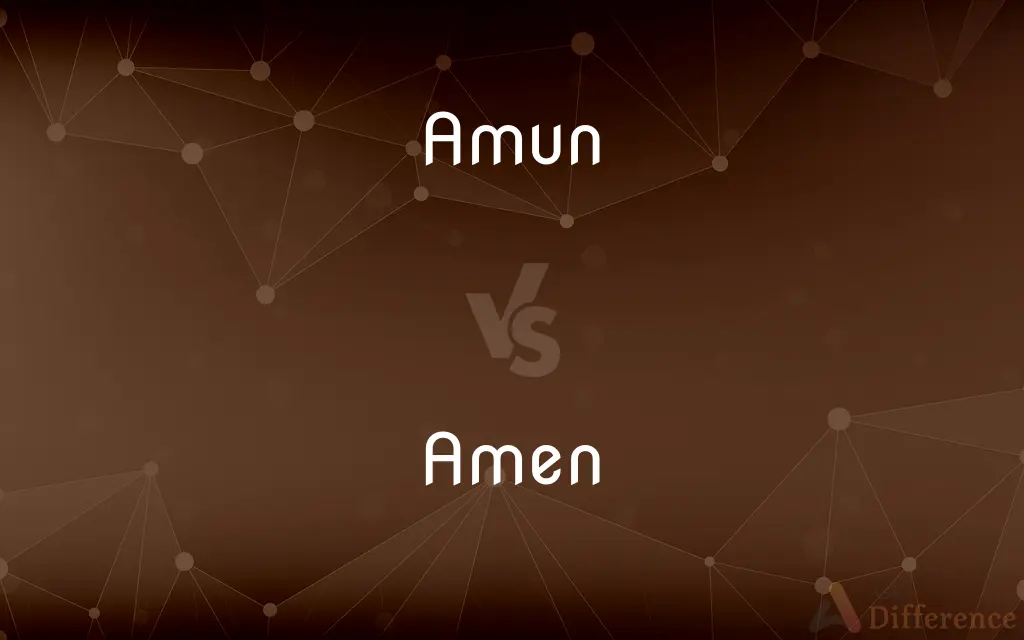Amun vs. Amen — What's the Difference?
By Tayyaba Rehman & Maham Liaqat — Updated on April 18, 2024
Amun is an ancient Egyptian deity symbolizing creation and the air, while Amen is a Hebrew term meaning "so be it," commonly used in prayers.

Difference Between Amun and Amen
Table of Contents
ADVERTISEMENT
Key Differences
Amun, often associated with the wind and air, represents the hidden and mysterious aspects of life in Egyptian mythology. In contrast, Amen, a Hebrew affirmation found in Jewish, Christian, and Islamic prayers, signifies agreement and confirmation, often concluding prayers and hymns.
In ancient Egypt, Amun rose to prominence and was revered as the king of the gods, particularly during the New Kingdom. Meanwhile, the word Amen has been used since ancient times across various religions to express solemn ratification and unwavering trust in the divine.
Amun was frequently combined with the sun god Ra to form Amun-Ra, embodying supreme power and authority. Whereas, Amen serves as a reaffirmation of faith and is embedded deeply in liturgical practices, emphasizing the communal assent to prayer.
Amun’s worship included complex temple rituals and was central to the religious and political life in Thebes. On the other hand, Amen is typically spoken or sung, playing a crucial role in personal and communal worship settings, underscoring its verbal importance.
While depictions of Amun include images of a man wearing a double-plumed hat, symbolizing his royal authority and divine nature, Amen, as a word, holds no physical representation but carries significant spiritual weight and meaning in religious texts.
ADVERTISEMENT
Comparison Chart
Definition
Egyptian deity of creation and air
Hebrew affirmation meaning "so be it"
Cultural Context
Ancient Egypt, particularly prominent in Thebes
Used in Jewish, Christian, and Islamic prayers
Role in Religion
King of the gods, involved in rituals
Concluding affirmation, expressing agreement
Symbolism
Hidden forces, air, and creation
Trust, affirmation, and communal assent
Representation
Often depicted as a man with a double-plumed crown
No physical form, used verbally in prayers
Compare with Definitions
Amun
Part of the Theban Triad.
Amun, Mut, and Khonsu formed a powerful triad of deities in Thebes.
Amen
Symbol of agreement.
Saying Amen expresses agreement with the words spoken in worship.
Amun
Symbol of hidden power.
Amun represents the unseen forces in the universe.
Amen
Expression of faith.
By saying Amen, believers affirm their trust in divine will.
Amun
King of the Egyptian gods.
Amun was worshipped as the king of the gods in ancient Thebes.
Amen
Used in multiple religions.
Amen is a significant term in Judaism, Christianity, and Islam.
Amun
Associated with creation.
Amun was often credited with the creation of the world.
Amen
Affirmation in prayers.
Worshipers commonly end their prayers with Amen.
Amun
Worshipped across Egypt.
Amun's influence extended beyond Thebes, affecting all of Egypt.
Amen
Part of liturgical practices.
Amen is often used in both private and communal religious contexts.
Amun
Amun (US: ; also Amon, Ammon, Amen; Ancient Egyptian: jmn, reconstructed as /jaˈmaːnuw/ (Old Egyptian and early Middle Egyptian) → /ʔaˈmaːnəʔ/ (later Middle Egyptian) → /ʔaˈmoːn/ (Late Egyptian); Coptic: ⲁⲙⲟⲩⲛ; Greek Ἄμμων Ámmōn, Ἅμμων Hámmōn) was a major ancient Egyptian deity who appears as a member of the Hermopolitan Ogdoad. Amun was attested from the Old Kingdom together with his wife Amunet.
Amen
Amen (Hebrew: אָמֵן, ʾāmēn; Ancient Greek: ἀμήν, amên; Arabic: آمین, āmīn(a); Aramaic/Classical Syriac: ܐܡܝܢ, 'amīn) is an Abrahamic declaration of affirmation first found in the Hebrew Bible, and subsequently in the New Testament. It is used in Jewish, Christian and Islamic worship, as a concluding word, or as a response to a prayer.
Amun
The Egyptian god of life and reproduction, sometimes represented as a man with a ram's head.
Amen
Variant of Amun.
Amen
Used at the end of a prayer or a statement to express assent or approval.
Amen
At the end of religious prayers: so be it.
Amen
In many Abrahamic religious texts and creeds: certainly, verily.
Amen
An expression of strong agreement, often in the phrase "amen to that".
Amen
An instance of saying ‘amen’.
Amen
A title of Christ; the Faithful One (especially with reference to Revelation 3:14)
Amen
(intransitive) To say amen.
Amen
(transitive) To say amen to; to ratify solemnly.
Amen
An expression used at the end of prayers, and meaning, So be it. At the end of a creed, it is a solemn asseveration of belief. When it introduces a declaration, it is equivalent to truly, verily.
And let all the people say, Amen.
Amen, amen, I say to thee, except a man be born again, he can not see the kingdom of God.
Amen
To say Amen to; to sanction fully.
Amen
A primeval Egyptian personification of air and breath; worshipped especially at Thebes
Common Curiosities
How is Amen used in religious contexts?
Amen is used to express agreement and conclude prayers in religious practices.
What does Amun symbolize in Egyptian culture?
Amun symbolizes creation, air, and the hidden forces of life.
Why is Amen important in prayers?
Amen signifies the worshiper's agreement and trust in the divine, sealing prayers with affirmation.
What roles did Amun hold in mythology?
Amun was a creator god and the king of the gods in Egyptian mythology.
What is the origin of Amun?
Amun originated as a local deity in ancient Egypt and became a national god.
Can Amen be found in religious texts?
Yes, Amen appears frequently in the Bible, Torah, and Islamic prayers.
What significance does Amen hold outside of religious contexts?
Outside of religious contexts, Amen is sometimes used culturally to express strong agreement.
How did Amun influence Egyptian politics?
Amun's priesthood gained considerable power, influencing the political landscape of Egypt.
Were there specific temples dedicated to Amun?
Yes, the Karnak Temple complex was a significant site of worship for Amun.
Is Amen specific to one religion?
No, Amen is used across Judaism, Christianity, and Islam.
What are the main festivals associated with Amun?
Major festivals for Amun included the Opet Festival, which celebrated his fertility aspects.
How does the meaning of Amen impact its use in prayers?
The meaning of "so be it" emphasizes acceptance and faith, reinforcing the prayer's intent.
How has the worship of Amun evolved over time?
While Amun's worship diminished after the ancient era, he remains an iconic figure in Egyptian mythology.
How does the community perceive the use of Amen?
Amen is widely accepted and valued as a vital part of liturgical traditions.
Did Amun have any family connections in mythology?
Amun was part of the Theban Triad with his consort Mut and their son Khonsu.
Share Your Discovery

Previous Comparison
Denarius vs. Sesterce
Next Comparison
Quadrangle vs. QuadrilateralAuthor Spotlight
Written by
Tayyaba RehmanTayyaba Rehman is a distinguished writer, currently serving as a primary contributor to askdifference.com. As a researcher in semantics and etymology, Tayyaba's passion for the complexity of languages and their distinctions has found a perfect home on the platform. Tayyaba delves into the intricacies of language, distinguishing between commonly confused words and phrases, thereby providing clarity for readers worldwide.
Co-written by
Maham Liaqat













































